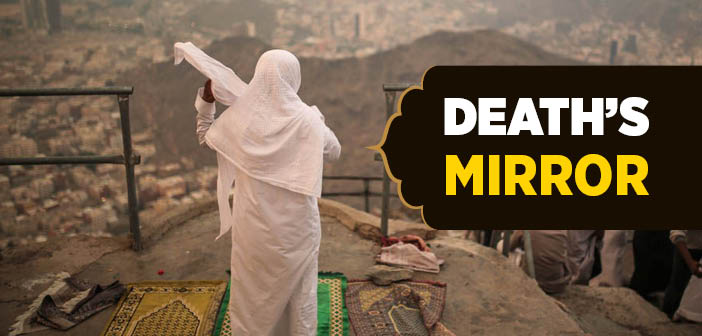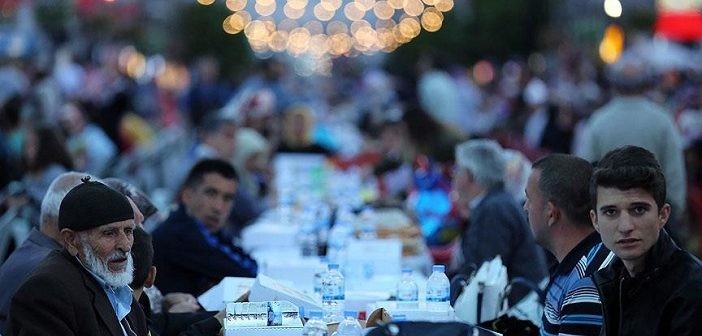
The Balance (Mizan)
What is the mizan in islam? What is the meaning of name mizan?
Mizan is the name given to the Balance through which the records of people’s deeds, good and evil, will be laid open and measured. On the Day of Reckoning, balances are set up, the exact nature of which is known only to Allah, and the actions of everyone will dealt out and weighed, without any person being wronged in the least.
Indeed, this truth is expressed in a Qur'anic verse thus:
"We will set up the Just Balance on the Day of Rising and no self will be wronged in any way. Even if it be no more than the weight of a mustard-seed, We will produce it. We are sufficient as a Reckoner." (Al-Anbiya, 21:47)
Allah, glory be to Him, declares that those whose scales of good deeds are heavy will be the prosperous, while those whose scales of evil deeds are heavy will be those who will face abiding punishment:
“The Weighing that Day will be the truth. As for those whose scales are heavy, they are the successful. As for those whose scales are light, they are the ones who have lost their own selves because they wrongfully rejected Our Signs.” (Al-A’raf, 7:8-9)
These verses describe the situation of the righteous believers and those who denied Allah's revelations. Even if the latter did perform some acts of goodness in this world, this will avail them not on that Day because of their denial. For it is unshakble belief that invests one's actions with value in the eyes of Allah.
The state of the sinning Muslims who are caught between these two groups is illustrated in a Qur'anic verse as follows:
"But others have acknowledged their wrong actions and mixed a right action with another that is wrong. It may well be that Allah will turn towards them. Allah is Ever-Forgiving, Most Merciful." (At-Tawba, 9:102)
When Allah Almighty wills to punish those who do not concede their sins, or whose repentance is not accepted, He excludes them from His mercy. As a consequence, their scales are light on the Day of Reckoning because they have no acceptable good deeds, and they will be cast into the Fire.
Concerning the weighing of deeds on that Day, Allah, glory be to Him, declares:
"As for him whose balance is heavy, he will have a most pleasant life. But as for him whose balance is light, his motherland land is Hawiya. And what will covey to you what that is? A raging Fire!" (Al-Qari’a, 101:8-11)
Anas ibn Malik (may Allah be well pleased with him) narrates:
"I asked the Messenger of Allah (may Allah bless him and grant him peace) to intercede for me on the Day of Judgement.
He said, 'I am the one to do so.'
I said, 'O Messenger of Allah! Then where shall I seek you?'
He said, 'Seek me for the first time on the Bridge (Sirat).'
I said, '(What) if I cannot find you upon the Bridge?'
He said, 'Then seek me at the Balance (Mizan).'
I said, 'And if I cannot find you at the Balance?'
He said, 'Then seek me at the Sacred Basin (Hawd), for indeed I will not be anywhere except at these three places.'" (Tirmidhi, Qiyama, 9/2433; Ahmad, III, 178)
This demonstrates that the Messenger of Allah (may Allah bless him and grant him peace) will intercede with Allah on behalf of his community at the Bridge, the Balance, and will offer them the water of the Sacred Pond.
As was discussed in the section on the intercession, the intercession is true and will take place by the leave and power of Allah Almighty. For it is to Allah that the whole authority to intercede exclusively belongs. He will grant permission to intercede to whomsoever He wills. He will not allow the Messenger to intercede for some of his slaves, or He will allow him intercession after a certain time. In other words, the intercession should not be misconstrued, and it should not be forgotten that everything is entirely at Allah’s disposal and authority.
The Messenger of Allah (may Allah bless him and grant him peace) describes a scene from the Balance:
"Allah will single out a person from my community before all of creation on the Day of Judgement. Ninety-nine scrolls will be laid out before them, each scroll as far as the eye can see.
Then He will say, 'Do you deny any of this? Have those who recorded this wronged you?'
The person will say, 'No, O Lord!'
Allah will say, 'Do you have any excuse?'
The person will say, 'No, O Lord!'
So Allah will say, 'Indeed, you have good deeds with Us, and you will not be wronged this Day.'
Then a card will be brought out on which is written, Ash-hadu an lā ilāha illāllah wa ash-hadu anna Muhammadan Rasulullah (I bear witness that there is no god but Allah, and I bear witness that Muhammad is the Messenger of Allah).
Allah will say, 'Behold how your deeds are weighed.'
The person will say, 'O Lord! What good is this card next to these scrolls?'
Allah will say, 'You shall not be wronged.'
The scrolls will be put on one side (of the scale), and the card on the other side: the scrolls will be light, and the card will be heavy. For nothing is heavier than the Name of Allah." (Tirmidhi, Iman, 17/2639; Ibn Maja, Zuhd, 35; Ahmad, II, 213; Hakim, I, 46/9)
This narration demonstrates how precious true faith in Allah is. It also reveals the importance of the declaration of faith that is uttered at the moment of death. Allah has thus commanded the believers as follows:
"You who believe! Have taqwa of Allah with a taqwa due to Him and do not die except as Muslims." (Al ‘Imran, 3:102)
Similarly, another matter that will be the cause for a person’s happiness at the Balance is noble character, which denotes the reflection of a true and perfect belief upon all one's states and actions.
The Messenger of Allah (may Allah bless him and grant him peace) says:
"Nothing will weigh heavier on the scales on Day of Resurrection than good character." (Ahmad, VI, 442, 451; Ibn Hibban, Sahih, II, 230)[1]
The Intercession of the Believers, One's Actions and the Qur'an
Alongside the Great Intercession of the Messenger (al-Shafa'a al-Uzma), the believers will also be able to intercede with Allah on each other's behalf. Allah's Messenger (may Allah bless him and grant him peace) once said:
"Through the intercession of one person from my Community, more than Banu Tamim will be admitted into the Garden."
They asked, "O Messenger of Allah! Someone other than you?"
Allah's Messenger (may Allah bless him and grant him peace) said, “Yes, other than me." (Tirmidhi, Qiyama, 12/2438; Ibn Maja, Zuhd, 37; Darimi, Riqaq, 86; Ahmad, III, 469)
Similarly, the Messenger of Allah (may Allah bless him and grant him peace) has also said:
"On the Day of Resurrection, the companions of the Garden will be aligned in ranks and a person from among the companions of the Fire will approach and say:
'O so and so! Do you not remember the day when you asked for water and I gave you water to drink?' So, they will intercede for the person.
And another person will come and say, 'Do you not remember the day when I gave you water with which to purify yourself?' and they will intercede for this person.
Yet another person will say, 'Do you not remember the day when you sent me to do such and such for you, and I went and did it for you?' And he will intercede for him." (Ibn Maja, Adab, 8)
The message we need to take from this Prophetic narration is the importance of serving Allah's slaves, without discrimination. This is how valuable a capital for the Next World it is to receive the prayers of the believers.
Allah's Messenger (may Allah bless him and grant him peace) has informed us that the Qur'an, too, will intercede on that Day:
"Recite the Qur'an, for on the Day of Resurrection it will come as an intercessor for those who recite It." (Muslim, Musafirin, 252)
Again, the Messenger of Allah (may Allah bless him and grant him peace) says:
"Indeed, there is a chapter in the Qur’an of thirty verses, which interceded for a man until he was forgiven. It is (the Qur'anic chapter which reads,) "tabārak alladhī biyadihi l-mulk". (Tirmidhi, Fada'il Qur'an, 9/2891)
The Qur'an is a miraculous book which enables one to live a life of happiness and bliss in this world and in the Next World. Leading a life in line with the teachings and injunctions of the Qur'an is the essential duty of every believer. Otherwise, while we are hoping to attain the Great Intercession of Allah's Messenger (may Allah bless him and grant him peace) and the noble testimony of the Qur'an, we may – God forbid – fatally find them as claimants against us. That the Messenger of Allah (may Allah bless him and grant him peace) will bring forth a complaint against those who lead their lives in opposition to the Qur'an is expressed in a Qur'anic verse as follows:
"Then the Messenger says, ‘My Lord, my people treat this Qur´an as something to be ignored." (Al-Furqan, 25:30)
According to narration, the Qur'an itself will assume a visible form and voice the following complaint:
"Whoever learns the Qur'an but does not concern themselves and engage with it, the Qur'an will take hold of them and say:
'O Lord! This slave held me captive, abandoned me and kept away from me. They did not act on my message and teachings. Judge between me and them.'"[2]
In other words, so as to avoid being the subject of such complaint in the Next World, we must frequently read the Qur'an, in close observance of the rules of its proper pronunciation and articulation, become acquainted with its deeper meanings and strive to apply these in our lives with utmost sincerity.
It is an immeasurable honour for the believers to be the direct addressees of the Qur'an, which is a miracle that will continue until the Day of Judgement. Giving heartfelt heed to this Divine Letter is a prescription of felicity for all of us. We must also know, however, that it is not sufficient to merely say that we love the Qur'an. If we do indeed love the Qur'an, how much are we acquainted with it? To what extent is its morality reflected upon us? Are we able to adhere to its laws and principles? Do we send our children to special Qur'an courses to instil in them the culture and morality of the Qur'an?
We should frequently ask ourselves these very questions and try our utmost to remedy our deficiencies in this regard before it is too late.
In short, we must never forget that the Qur'an will be either an intercessor or a complainant against us on the Day of Reckoning.
[1] Cf. Abu Dawud, Adab, 7/4799; Tirmidhi, Birr, 62/2002.
[2] al-Alusi, Ruh al-Ma'ani, Beirut, n.d., XIX, 14.
Source: Osman Nuri Topbaş , Journey To Eternity, Erkam Publications
Dying as Muslims

Death’s Mirror













